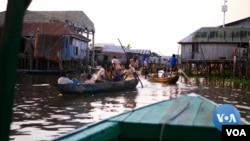Experts say the disruption to Africa’s coastal and port cities will have a devastating impact on inland economic growth, thus impacting the continent and the world.
On the outskirts of Cotonou, dwellings in the town of Ganvie are built on stilts in a coastal lagoon and is sometimes referred to as the Venice of Africa.
Local government officials in Sô-Ava, where Ganvie is located, told VOA that flooding has worsened in recent decades.
“There are two primary economic activities here in the commune of Sô-Ava, agriculture, and fishing. So, when the water rises the crops are destroyed. Also, the freshwater fish disappear… As a result, economic life becomes difficult,” Agossou Zamenou Leon, Sô-Ava government official said.
The effects on the community have been devastating and local residents told VOA that their houses have been rendered uninhabitable with many of their belongings destroyed.
‘’Because of the flooding, the house you see was destroyed last year and I had to rebuild it on another piece of land to prevent the water from coming in again,” said Ganvie resident, Andre Sankoe.
Sankoe said he knows parents whose children drowned in the flooding.
Alexandre Bodo, another Ganvie resident, said his livestock living in a pen were lost to the flood, and the water filled his house to this level.
“We lose our houses, and we have no money to rebuild them, so the whole family sleeps in a boat,” he said.
Communities along the coast, around estuaries and coastal lagoons, like Ganvie, will be the first to bear the brunt of the impacts. Flooding and coastal erosion will also affect Africa’s ports. Astrid Rosemary Ndagano Haas, an Urban Economist told VOA that not enough is being done.
“One of the things that I find shocking is how little finance is going to support these cities overall in terms of building infrastructure and services, but particularly with climate. It’s extremely important that we not only adapt, but with the rising sea levels that mitigation is taken into account as well.”
The experts said the stretch of West Africa’s coastline from Abidjan to Lagos is on track to become the world's largest megalopolis and could be home to half a billion people by the end of this century. Aside from Ganvie, Lagos and Ghana’s capital of Accra experienced major floods in 2022.
Daniel Hoornweg is with Ontario Tech University.
“That’s probably 50% of Africa’s or more than 50% of Africa’s total GDP in that strip, so if it develops well, it could really anchor the continent, it could anchor the globe in terms of heading into this sustainable development.”
